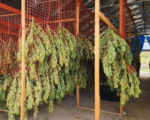Sacramento’s city leaders just opened the door to a new era of social cannabis spots, approving lounges and cafes where adults can light up legally. This bold move, decided by a narrow vote with the mayor tipping the scales, promises to reshape how people enjoy weed in California’s capital. But what does it mean for locals, businesses, and the community? Dive in to find out.
Council’s Historic Vote Sparks Change
The Sacramento City Council voted yes on licensing adult-use cannabis lounges and cafes this week, marking a big step forward for the city’s weed scene. Mayor Kevin McCarty cast the deciding vote in a tight decision that could see the first spots open by 2026. This approval comes after months of debate, with council members weighing benefits against concerns from youth groups worried about rising drug use.
Councilmember Phil Pluckebaum championed the idea, saying it gives people a safe, legal place to consume cannabis without turning to public parks or streets. The new rules require special permits and top-notch ventilation systems to keep things clean and controlled.
Youth activists pushed back hard during hearings, arguing the cafes might encourage more teens to try cannabis. Despite the pushback, the council moved forward, betting on strict regulations to handle risks.
One key rule stands out.

Business Owners Gear Up for Launch
Local dispensary owners are thrilled and ready to jump in. Maisha Bahiti, who runs Crystal Nugs, shared that her team designed their space with lounges in mind, hoping this day would come. Now, with approval in hand, they’re set to expand into cafe-style setups.
These new spots won’t just sell cannabis. They’ll offer a social vibe, much like coffee shops but with weed on the menu. State laws, updated recently, allow lounges to serve non-alcoholic drinks and host live events, drawing inspiration from Amsterdam’s famous cafes.
Bahiti’s story shows the excitement building. Her dispensary already has room carved out for lounges, and she expects to apply for permits soon. This could boost sales and draw tourists to Sacramento.
But not everyone’s on board. Some residents fear traffic and crowds in neighborhoods.
The push for equity plays a role too. Sacramento’s past programs, like the Cannabis Opportunity Reinvestment and Equity initiative from 2018, aimed to help minority business owners hit hard by old drug laws. This approval builds on that, adding three new dispensary permits earlier this year to spread opportunities wider.
Rules and Limits Shape the Future
To keep things in check, the city set clear guidelines for these cannabis cafes. Businesses need advanced air systems to filter smoke, and lounges can’t pop up just anywhere. Leaders are eyeing geographic limits to avoid clustering near schools or parks.
Here’s a quick look at the main requirements:
- Special city permit required for operation.
- Age limit: 21 and up only.
- No alcohol sales allowed on site.
- Ventilation tech to control odors and smoke.
These rules aim to balance fun with safety. Council discussions highlighted worries about public health, especially after a pilot program got the green light last November.
Data from similar spots in Los Angeles shows mixed results. A 2023 study by the University of California found cannabis lounges cut down on street use but raised concerns about secondhand smoke exposure. Researchers surveyed over 500 users and noted a 15% drop in public consumption complaints in areas with lounges.
Still, Sacramento’s approach feels fresh. By tying cafes to existing dispensaries, the city hopes to streamline growth without overwhelming resources.
One business owner called it a game-changer.
Impact on Community and Economy
This decision could pump new life into Sacramento’s economy. With cannabis sales already booming statewide, lounges might attract visitors and create jobs. A report from the California Bureau of Cannabis Control last year pegged the industry’s value at over $5 billion, with lounges potentially adding millions in local taxes.
Locals like Pluckebaum see it as a win for public spaces. Instead of folks smoking in parks, cafes provide a controlled spot. That could ease tensions in neighborhoods and free up police for other duties.
On the flip side, critics point to health risks. Youth advocates cite a 2024 study by the Centers for Disease Control, which linked easier access to higher teen experimentation rates. In areas with lounges, reported youth cannabis use rose by 8% over two years.
The city’s equity focus adds depth. By prioritizing permits for those affected by past drug policies, Sacramento aims to fix old wrongs. Since 2018, the CORE program has helped dozens of minority entrepreneurs start businesses, and this expansion could double that impact.
Communities are watching closely.
Challenges Ahead for Rollout
Rolling out these cafes won’t be smooth. Permit processes could take months, and not every dispensary will qualify. City officials plan to monitor the pilot closely, ready to tweak rules if issues arise.
One hurdle is ventilation costs, which might hit small businesses hard. Estimates from industry experts put setup fees at $50,000 or more per lounge. That could limit who joins in.
Public opinion is split. A quick poll by the Sacramento Bee last month showed 55% support among adults, but only 40% among parents. Debates raged at council meetings, with stories from residents on both sides.
Despite bumps, backers remain hopeful. They argue cafes normalize responsible use and cut black market sales.
The real test comes next year.
Sacramento’s approval of cannabis cafes signals a shift toward more open, social weed culture, blending business growth with community needs while tackling old inequities. It’s a move that could inspire other cities, offering hope for safer, more inclusive spaces amid ongoing debates.
Maria Garcia is an award-winning author who excels in creating engaging cannabis-centric articles that captivate audiences. Her versatile writing style allows her to cover a wide range of topics within the cannabis space, from advocacy and social justice to product reviews and lifestyle features. Maria’s dedication to promoting education and awareness about cannabis shines through in her thoughtfully curated content that resonates with both seasoned enthusiasts and newcomers alike.








